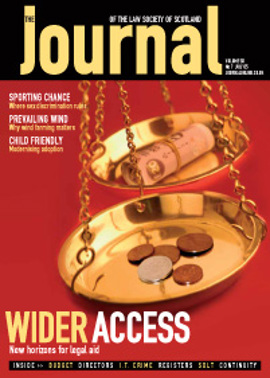Always look on the bright side

Much has been written about the ethos and philosophies behind the Licensing (Scotland) Bill. Stemming from the Nicholson Report, it contains much that seems sensible and well drafted. Some of the changes which the Scottish Executive has made are ill advised, particularly in relation to objections; however, academic commentators have, in the main, given their qualified approval.
But how will things translate into the real world, whatever that is? Those seeking to pick fault and to foresee doom can easily find omens and harbingers to justify their gloomy predictions. Critics of the existing system of licensing can point to the “patchwork” effect, with often inexplicable variations in practice even within different divisions of a single licensing board. Those who oppose quangos may have reservations regarding the notion of a national licensing forum. Anyone who has found himself on a committee with a single-agenda, intellectually challenged campaigner may shy away from a local licensing forum. Will licensing standards officers turn out to be little Hitlers, the new Blue Meanies?
Along with others, I have raised these questions during the various consultation stages. As we move towards the new regime, I would suggest that the time has come to move away from the abstract, and to consider how we can have a system which works in practice to deliver the sensible licensing objectives in the bill.
There is no doubt that our licensing boards leave much to be desired. This is not the fault of those who sit on them. As I understand it, licensing board work for councillors is regarded as seriously unglamorous, and it often shows. If the mandatory training for board members includes an education into the vital importance of the tourism and hospitality industries to all of Scotland, things will improve. Training has already started and is making a real difference. I am a member of one of the newly formed Tourism Alliances, and have been impressed by the attitude and input of the council partners and councillors themselves.
The licensed trade has a big part to play. Good trade associations are already trying to exercise the sort of influence to which they will be entitled as of right as part of a local forum. The secretary of my local trade association has worked tirelessly to get his members’ voice heard by board members. At present many board members show an obvious lack of understanding of the particular circumstances of the licensed trade. Continuing dialogue is helping resolve that problem.
But the biggest change can come only with a change of attitude from the professionals who run the system. If we move into the new regime with our thinking unchanged, we will end up with a system containing many of the flaws of its predecessor. We must have considered policies, formulated in advance, not “on the hoof”. For this to be done properly, there must be genuine consultation of, and input from, all interested parties. Philip Kolvin, in his excellent commentary on the English Licensing Act 2003, Licensed Premises: Law & Practice (Tottel Publishing, 2004), sets out key features for his vision of a unifying philosophy. I commend it to all. Strategic partnerships form the key. Our bill retains the notion of local input to identify local problems and solutions. That is fine; however, boards must base their decisions on evidence, not on intuition. Those advising licensing boards must do their own homework and change their thinking, to avoid repetition of past mistakes. Again, a study of Mr Kolvin’s book is recommended. To carry on where we left off simply will not do.
If the change is implemented properly we should be able to enjoy an era where “the business of licensing is much more than saying no to licensing proposals, but facilitating a regime in which the trade knows what is needed, in terms of location and other operating conditions, to obtain the licence it needs with which to trade, and residents are clear what is likely to be tolerated, and where”. If it is not, and we are left with a fragmented licensing system, with no discernible policies, we shall have wasted the efforts of Sheriff Principal Nicholson and his committee.
Tom Johnston, Partner, Young & Partners, Business Lawyers, Dunfermline and Glenrothes
In this issue
- Commissioner: Public Authorities must do more
- Supporting legal aid
- No country cousins
- Making the money go further
- Adopting a new approach
- Gordon giveth and Gordon taketh away
- A blow for the future
- A Wie hint of change?
- Raising the bar
- The IT crimewave
- The directing mind
- Going through the motions
- Planning in the park
- Always look on the bright side
- Scottish Solicitors' Discipline Tribunal
- Website reviews
- Book reviews
- The race to the registers revisited
- SDLT: getting it right
- SDLT: barcoding
- Business sense






